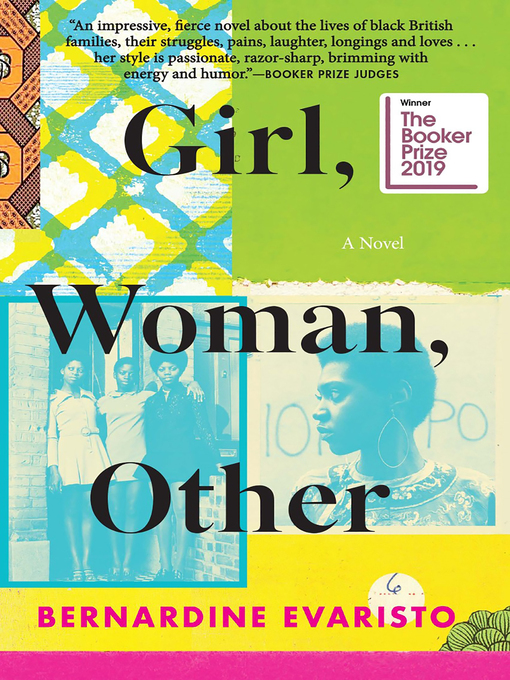Review by Booklist Review
Co-winner of the 2019 Man Booker Prize, Anglo-Nigerian writer Evaristo's (Mr. Loverman, 2014) courageous and intersectional novel explores Black British identity and unfolds in a single night, or over the course of 100 years, depending on how readers look at it. It opens with the story of Amma, a formerly fringe, lesbian playwright whose newest work, The Last Amazon of Dahomey, opens tonight at London's National Theatre. Her daughter, Yazz, uber-confident thanks to Amma's emotionally affirming parenting, goes next, followed by Dominique, Amma's longtime friend and one-time partner in artistic consciousness- and hell-raising. Following chapters expand the novel's web three characters at a time (a table of contents lists their names, but it's exciting to be surprised by the revelation of who will take center stage) until there are 12: 11 women and 1 nonbinary person. Evaristo uses minimal punctuation and fluid paragraphs for a high-velocity style of exposition. And, oh, what is exposed. Hearing from mothers and their children, teachers and their students across generations, readers might expect that they'll get to see just what these characters can't know about one another, but they won't imagine the dazzling specificities nor the unspooling dramas; they will be entertained, educated, and riveted.--Annie Bostrom Copyright 2019 Booklist
From Booklist, Copyright (c) American Library Association. Used with permission.
Review by Publisher's Weekly Review
Evaristo (Mr. Loverman) beguiles with her exceptional depictions of a range of experiences of black British women in this Man Booker--shortlisted novel. Each interconnected chapter focuses on one of 12 women across decades within a few degrees of connection to middle-aged lesbian Amma. In the present, Amma remembers her years of precarious living and feminist agitation through theater while preparing for the opening night of her of her play about African Amazonian warriors at the National Theatre. Amma's firebrand daughter, Yazz, hopes for a boyfriend at university but instead forms a diverse friend group that challenges her ideas about race and privilege. Amma's best friend, Dominique, moves to America with an increasingly controlling girlfriend. Amma's oldest friend, Shirley, is a discouraged schoolteacher, still hurt that her former student Carole did not appreciate her help launching her toward her lucrative, if frustrating, bank career. Shirley's prickly colleague Penelope, a twice-divorced middle-class woman, hires Carole's mother, Bummi, a Nigerian immigrant, as a cleaner. Morgan, a non-binary social media personality, enjoys laboring on the family's north England farm, while their nonagenarian great-grandmother, Hattie, internally grumbles about her descendants' indifference and the shock of family secrets. Hattie's deceased mother, Grace, proudly Abyssinian, struggles with the death of her young children in a chapter set in the 1920s. The after-party following Amma's play sparks awkward and revealing encounters between many of the women. Evaristo's fresh, clipped style adds urgency riddled with sparks of humor. This is a stunning powerhouse of vibrant characters and heartbreaks. Agent: Emma Paterson; Aitken Alexander (Dec.)
(c) Copyright PWxyz, LLC. All rights reserved
Review by Kirkus Book Review
A magnificent chorus of black British voices and a winner of the 2019 Booker Prize."Amma / is walking along the promenade of the waterway that bisects her city, a few early morning barges cruise slowly by." These are the opening lines of Evaristo's eighth novel. The unexpected line breaks, the paucity of punctuation and capitalization: These stylistic choices are, at first, disorientingand that makes perfect thematic sense. Amma is a black woman, a lesbian, and a fiercely feminist playwright who is gaining mainstream attention after decades of working on the margins. Each of the 12 characters Evaristo conjures here have had to work hard to make a place for themselves in a culture that regards them as outsiders even if they've lived in the United Kingdom their entire lives. Instead of forcing her creations to code-switch to make their lives comfortable for general consumption, Evaristo compels the reader to accommodate and adjust. The rewards for this tiny bit of mental labor are extraordinary. There is no overarching story, but the lives of these women and one "gender-free" character intersect in revelatory ways. For example, Shirley is both one of Amma's oldest friends and the teacher who helps Carole work her way out of a council flat and into Oxford. For Amma, Shirley grew from being "the only other brown girl" on the playground to being the straight-laced friend who always supported her unconventional careerand loaned her money when necessary. For Carole, Shirley is "Mrs King," the no-nonsense taskmaster who only cared about her when her grades were perfect. When she takes center stage herself, we discover that Shirley is both of these people and much more. As she creates a space for immigrants and the children of immigrants to tell their stories, Evaristo explores a range of topics both contemporary and timeless. There is room for everyone to find a home in this extraordinary novel.Beautiful and necessary. Copyright Kirkus Reviews, used with permission.
Copyright (c) Kirkus Reviews, used with permission.


